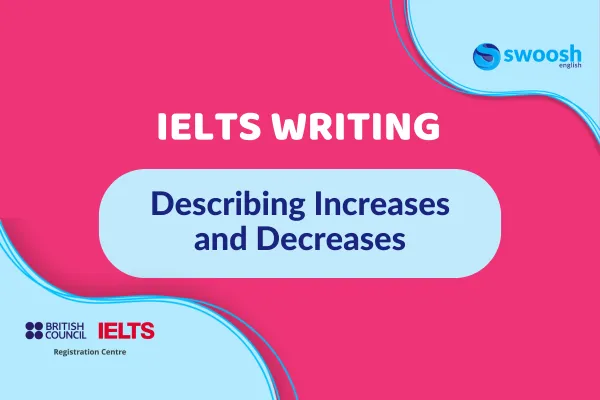Blog
Browse our library of helpful articles

Describing Increases and Decreases in IELTS Writing
This article aims to provide you with the main verb and noun forms necessary for describing increases and decreases in IELTS Writing. This vocabulary area is highly likely to be required in the IELTS Writing test, making it an essential area of study during your preparation.
Increase
Verbs
The primary verb is 'increase,' with similar alternatives such as:
Climb – signifying an increase to a high level: "Temperatures are expected to climb to record levels in the next few decades."
Escalate – indicating an increase to a high level, typically with undesirable outcomes: "Prices escalated in the last quarter."
Gain – often used to denote an increase in speed, weight, or height: "A newborn baby will gain weight at around a few grams every day."
'Go up/rise' – used with numbers, prices, temperatures, etc., and to show an increase in the level or standard of something: "Living standards rose over the first ten years."
Grow – signifying an increase over time: "China’s economic output continues to grow at a remarkable annual rate."
Widen – used to show how much the difference between amounts increases or how much the range of things available expands: "The range of university courses has widened tremendously in recent years."
To increase by a specific amount
Double – become twice as much or many: "Spending on clothes doubled in 2012."
Triple/treble – become three times as much or many: "The number of old people living in poverty has trebled in the last ten years."
Quadruple – become four times as much or many: "The number of traffic accidents quadrupled in 2018."
To increase quickly or suddenly and by a large amount
Go through the roof – increase to an extremely high level: "Ice-cream sales have gone through the roof this summer."
Rocket (skyrocket) – primarily used for sudden significant increases in money-related activities (prices, costs, sales, etc.): "The value of the dollar has rocketed against the euro."
Soar – increase quickly to a high level: "Temperatures soared into the 30s."
Spiral – especially used for costs that increase quickly and uncontrollably: "Costs of the project have spiralled out of control."
To increase by gradually adding more
Accumulate/build up – gradually increase in number or amount until there is a large quantity in one place: "The amount of rubbish on the beach has accumulated over the summer months."
Pile up – often used with work or debt: "The work that nurses are expected to do has piled up, and many hospitals are struggling to cope."
Nouns
An increase in number or amount
Growth – an increase in amount, quantity, population, etc.: "There has been a significant growth in the population of developing countries."
Rise – used similarly to the verb form: "There was a small rise in pass rates this year."
Upturn/recovery – an increase after a period of no growth: "There has been an upturn in the amount of trade after a period of no growth."
An increase in the amount of money
'Rise' and 'increase' are the typical nouns used
Hike – a sudden increase in something like prices, wages, or taxes: "Nurses are hoping to get a 10% pay hike."
A sudden large increase
Explosion – a sudden and significant increase: "There has been a population explosion this century."
Leap – especially used with business costs, prices, activities: "Borrowers have been warned to expect another leap in interest rates."
Surge – a sudden increase in demand, profit, interest, etc.: "There has been a surge of interest in Korean dramas."
Decrease
Verbs
To become less
Decrease – become less, especially in business and technical subjects: "The speed of the motor gradually decreases to zero."
Go down/come down – become less: "I’m hoping prices will come down soon."
To decrease quickly or suddenly and by a large amount:
Cut – reduce something significantly, especially prices, time, or money: "The new system cut waiting times by 30%."
Fall/drop – become less, especially by a large amount; 'drop' also suggests a sudden decrease: "At night, the temperature drops well below zero."
Plummet/plunge – drop very rapidly and by a large amount: "The stock market plummeted 30 points after the announcement of the new taxation policy."
Take a nosedive/nosedive – become lower (and worse) very quickly, causing problems: "House prices have nosedived in the last month."
To decrease the number, amount, or size of something
Halve – reduce something by half: "Profits have been halved because of the economic slowdown."
Lower – especially used in business or technical subjects: "The boiling point was lowered by several degrees."
Reduce – make something less in amount or level, typically used when something like price or cost is intentionally lowered: "You can greatly reduce your heating bills with this new system."
Nouns
The noun forms corresponding to the above verbs are often the same:

It is important to note the specific meaning of 'decline' and avoid confusing it with the more commonly used 'decrease'. 'Decline' refers to a gradual decrease in something good or important, leading to a worsening situation: "We can expect a further decline in job vacancies."
So now it's over to you to start practicing your vocabulary for your IELTS exam. Good luck with your IELTS preparation and let us know if you have any questions below.

Describing Increases and Decreases in IELTS Writing
This article aims to provide you with the main verb and noun forms necessary for describing increases and decreases in IELTS Writing. This vocabulary area is highly likely to be required in the IELTS Writing test, making it an essential area of study during your preparation.
Increase
Verbs
The primary verb is 'increase,' with similar alternatives such as:
Climb – signifying an increase to a high level: "Temperatures are expected to climb to record levels in the next few decades."
Escalate – indicating an increase to a high level, typically with undesirable outcomes: "Prices escalated in the last quarter."
Gain – often used to denote an increase in speed, weight, or height: "A newborn baby will gain weight at around a few grams every day."
'Go up/rise' – used with numbers, prices, temperatures, etc., and to show an increase in the level or standard of something: "Living standards rose over the first ten years."
Grow – signifying an increase over time: "China’s economic output continues to grow at a remarkable annual rate."
Widen – used to show how much the difference between amounts increases or how much the range of things available expands: "The range of university courses has widened tremendously in recent years."
To increase by a specific amount
Double – become twice as much or many: "Spending on clothes doubled in 2012."
Triple/treble – become three times as much or many: "The number of old people living in poverty has trebled in the last ten years."
Quadruple – become four times as much or many: "The number of traffic accidents quadrupled in 2018."
To increase quickly or suddenly and by a large amount
Go through the roof – increase to an extremely high level: "Ice-cream sales have gone through the roof this summer."
Rocket (skyrocket) – primarily used for sudden significant increases in money-related activities (prices, costs, sales, etc.): "The value of the dollar has rocketed against the euro."
Soar – increase quickly to a high level: "Temperatures soared into the 30s."
Spiral – especially used for costs that increase quickly and uncontrollably: "Costs of the project have spiralled out of control."
To increase by gradually adding more
Accumulate/build up – gradually increase in number or amount until there is a large quantity in one place: "The amount of rubbish on the beach has accumulated over the summer months."
Pile up – often used with work or debt: "The work that nurses are expected to do has piled up, and many hospitals are struggling to cope."
Nouns
An increase in number or amount
Growth – an increase in amount, quantity, population, etc.: "There has been a significant growth in the population of developing countries."
Rise – used similarly to the verb form: "There was a small rise in pass rates this year."
Upturn/recovery – an increase after a period of no growth: "There has been an upturn in the amount of trade after a period of no growth."
An increase in the amount of money
'Rise' and 'increase' are the typical nouns used
Hike – a sudden increase in something like prices, wages, or taxes: "Nurses are hoping to get a 10% pay hike."
A sudden large increase
Explosion – a sudden and significant increase: "There has been a population explosion this century."
Leap – especially used with business costs, prices, activities: "Borrowers have been warned to expect another leap in interest rates."
Surge – a sudden increase in demand, profit, interest, etc.: "There has been a surge of interest in Korean dramas."
Decrease
Verbs
To become less
Decrease – become less, especially in business and technical subjects: "The speed of the motor gradually decreases to zero."
Go down/come down – become less: "I’m hoping prices will come down soon."
To decrease quickly or suddenly and by a large amount:
Cut – reduce something significantly, especially prices, time, or money: "The new system cut waiting times by 30%."
Fall/drop – become less, especially by a large amount; 'drop' also suggests a sudden decrease: "At night, the temperature drops well below zero."
Plummet/plunge – drop very rapidly and by a large amount: "The stock market plummeted 30 points after the announcement of the new taxation policy."
Take a nosedive/nosedive – become lower (and worse) very quickly, causing problems: "House prices have nosedived in the last month."
To decrease the number, amount, or size of something
Halve – reduce something by half: "Profits have been halved because of the economic slowdown."
Lower – especially used in business or technical subjects: "The boiling point was lowered by several degrees."
Reduce – make something less in amount or level, typically used when something like price or cost is intentionally lowered: "You can greatly reduce your heating bills with this new system."
Nouns
The noun forms corresponding to the above verbs are often the same:

It is important to note the specific meaning of 'decline' and avoid confusing it with the more commonly used 'decrease'. 'Decline' refers to a gradual decrease in something good or important, leading to a worsening situation: "We can expect a further decline in job vacancies."
So now it's over to you to start practicing your vocabulary for your IELTS exam. Good luck with your IELTS preparation and let us know if you have any questions below.
© 2023 - All Rights Reserved

